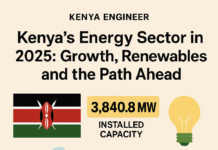Last Updated 1 week ago by Kenya Engineer
Africa’s long-term savings institutions are joining forces to drive infrastructure development on the continent through a landmark programme aimed at unlocking more than $1.17 trillion in national savings.
The Africa Finance Corporation (AFC) and the Africa Social Security Association (ASSA) on Tuesday unveiled the ‘Africa Saving for Growth’ initiative during the Global Africa Business Initiative (GABI) at the UN General Assembly. The programme is designed to mobilise pension funds, social security institutions, sovereign wealth funds, and other institutional investors into long-term infrastructure financing.
According to AFC’s 2025 analysis, African pension and social security institutions hold vast pools of assets, much of which are currently tied up in short-term, low-yield instruments. The new initiative seeks to redirect a portion of these savings into infrastructure projects that can boost productivity, enhance connectivity, and improve the quality of life for millions across Africa.
Key Deliverables
The initiative sets out practical frameworks and strategies, including:
-
Capital-pools database: A regularly updated and accessible dataset on African institutional savings.
-
Policy reform roadmap: Recommendations on prudential guidelines, risk-sharing mechanisms, and investment vehicles.
-
Mobilisation playbook: Country-level strategies to expand participation and formalise savings.
-
Diversification models: Shifting portfolios from low-yield government securities toward infrastructure and private-sector projects.
ASSA, which represents national social security funds from 15 African countries with more than $54 billion in pension assets, is a key partner. Morocco’s Caisse de Dépôt et de Gestion (CDG Group), one of Africa’s largest custodians of long-term capital, is also part of the alliance.
“Africa-led investment is the most effective way to quickly achieve the scale of transformation we need while catalysing international support for the continent’s infrastructure,” said Samaila Zubairu, President & CEO of AFC. “By joining forces, our pension funds and financial institutions can unlock new opportunities and drive development—without compromising fiduciary duties.”
Meshach Bandawe, Secretary General of ASSA, emphasised the importance of aligning the initiative with the African Union’s Agenda 2063: “This alliance is a pivotal step for Africa’s long-term savings community, underpinned by vibrant domestic and regional financial markets, connected by modern infrastructure and powered by shared growth.”
From Morocco, Khalid Safir, Director General of CDG Group, highlighted the challenge of transforming domestic savings into engines of growth: “We work closely with sister organizations across Africa to align efforts, share expertise, and unlock the full potential of long-term capital in the service of responsible development.”
Analysts point out that Africa’s infrastructure gap remains one of the biggest constraints to industrialisation, regional trade, and social inclusion. Kenya and other African countries stand to benefit significantly from such reforms, particularly in areas like transport corridors, energy access, and digital infrastructure—all of which are essential for driving sustainable growth.
By pooling savings and aligning regulatory frameworks, the Africa Saving for Growth initiative could provide a replicable model that attracts both domestic and international investors, ensuring pension fund sustainability while financing high-impact projects.
Since its founding in 2007, AFC has invested more than $15 billion in 36 African countries. With 45 member nations, it remains a key player in financing Africa’s infrastructure across sectors such as energy, natural resources, heavy industry, transport, and telecommunications.

























